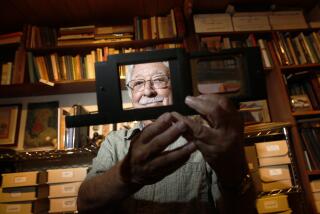Groucho as you’ve never seen him
- Share via
According to his son, Groucho Marx hated to have his picture taken by professional studio photographers. “He would be such a pain to the photographer,” recalls Arthur Marx, a playwright and screenwriter. “But he would let me shoot anything.”
Arthur Marx, 81, began snapping photos of his famous father and his equally famous uncles -- Chico, Harpo, Zeppo and Gummo -- when he was a kid and continued until Groucho’s death in 1977. And now he’s compiled these rare, candid photos for a new coffee-table book, “Arthur Marx’s Groucho: A Photographic Journey” (Phoenix). Not only is the book filled with Arthur Marx’s photos, but also with pictures shot by other photographers that come from his personal collection as well as from the collection of Marx Bros. archivist Paul Wesolowski.
The book was edited by Frank Ferrante, the actor who has toured for many yeas in Arthur Marx’s one-man show “Groucho: A Life in Revue.”
Ferrante was having lunch at Arthur Marx’s house a few years ago when Marx showed him a photo album. “Frank said, ‘Gee, you ought to do a book on this,’ ” says Marx, relaxing with Ferrante in a conference room at the Friars Club in Beverly Hills. (Among Marx’s many credits: the play “The Impossible Years,” movies such as “I’ll Take Sweden” and the TV series “Alice.”)
“The oddest thing was I had all the negatives from when I was in high school. Those days, when you had a 35-millimeter camera, they used to put the film in a metal container. Today they just put [the negatives] in an envelope. I had a whole box full of the pictures. They kept because no air got in them.”
“I would say that 50% of [the negatives] are in the book,” says Ferrante. “It was a treasure hunt. It gives you a history of the family, and you have Hollywood as the background.”
Arthur Marx began shooting pictures in 1934 when his best friend was given a 35-millimeter Leica camera as a birthday present. “I asked my father for a Leica,” says Marx, “but he said it was too expensive and he didn’t want to pay for a Leica. It was $125 in those days, so he got me an Argus. But the Argus took very good pictures.”
Browsing through the book, Marx and Ferrante stop on Pages 54 and 55, which feature pictures of Groucho sitting quietly in front of the fireplace in his Beverly Hills home without his traditional mustache and eyebrow makeup. They are Marx’s favorite pictures of his father.
“He liked to stay at home,” Marx says. “Ralph Edwards bought our house from my father during the war for $37,000.”
Another picture, from the late ‘30s, is of Arthur Marx’s younger sister Miriam dressed as Annie Oakley with Shep, their Australian sheepdog. “I loved that dog,” Marx says. “We got him when he was a puppy at Lake Tahoe. My father and I went on an overnight riding trip with a guy named Comstock of the Comstock Lode and we found this little dog on a sheep ranch.”
Marx often visited the sets of his father’s films. Perusing the book, he finds a picture of Chico at Santa Anita, where the Marx Bros. were shooting “A Day at the Races.” There’s another photo from “A Day at the Races” (not shot by Marx) that shows Groucho in a scene with co-star Maureen O’Sullivan.
“That’s my father’s girlfriend,” he says of O’Sullivan. “It really wasn’t his girlfriend, but he had a crush on her.”
Groucho was a good father, says his only son. “He would rather take me and my sister and his wife out to dinner than go out with Hollywood people,” he says. “He would rather have us at the dinner table at home. My mother would get in big fights with him because he wanted us to sit at the dinner table when he was having company. He took us to Europe. Chico didn’t take his daughter to Europe when we went in 1930. My mother said, ‘You can’t take them out of school,’ and my father said, ‘He’ll learn more in Europe than he would in school.’
Father versus son
Marx and his father had a falling out for a while in 1954 when Arthur wrote the bestseller “Life With Groucho.” “He said it made him look ridiculous,” Marx recalls. “But it really didn’t. The main editor at the Saturday Evening Post said, ‘Arthur made his father look like a regular human being.’ ”
“It was a very moving book,” Ferrante adds.
But Groucho, says Marx, “hit the ceiling” over the book. “He said, ‘I am not going to let you publish this,’ ” Marx says. “I had to go to the mat with him. He got his lawyers and I got my lawyers. He never actually sued me, but he made it uncomfortable.
“So finally I figured out how to beat him on the whole thing,” Marx says. “I asked the Saturday Evening Post to send me two sets of galleys. I made my corrections on my set, and I gave him his set to do what he wanted with. They were all marked up when he handed them to me. I said, ‘Thanks, I’ll take care of this’ and on the way out of the house, I dropped them in the trashcan and I never sent them in.”
Not only was the book a big hit, says Marx, his father ended up promoting it on his popular TV quiz show, “You Bet Your Life.”
More to Read
Sign up for our Book Club newsletter
Get the latest news, events and more from the Los Angeles Times Book Club, and help us get L.A. reading and talking.
You may occasionally receive promotional content from the Los Angeles Times.









